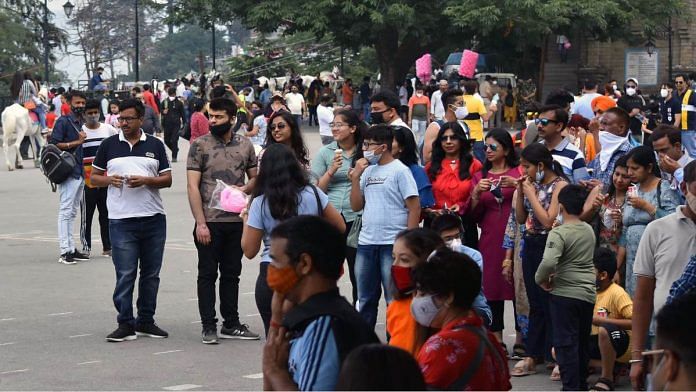New Delhi: Oh, haven’t we all been there! Weary from Covid stress and deprived escape for months by pandemic restrictions, we leapt at the first opportunity to travel. As soon as the lockdown guidelines at our favourite destinations were eased, we made a booking, packed our bags, and set off, all ready to let our hair down with a vengeance.
But scientists now warn our ‘revenge travel’ — an urge to travel after being under restrictions for an extended period of time — could come at a cost.
A study by researchers from the Indian Council of Medical Research (ICMR) and Imperial College London says ‘revenge travel’ could worsen the third Covid wave in India, and cause a higher peak between the months of February and March next year.
The study, published last month in the peer-reviewed Journal of Travel Medicine, sought to model the impact of domestic travel on a potential third Covid wave in India. The objectives included recognising the potential risks associated with increase in revenge tourism. ICMR Director General Balram Bhargava is among the researchers who carried out the study.
For this, the researchers created a mathematical model that sought to recreate what would happen in a hypothetical state of India that resembles Himachal Pradesh based on the dynamics of its first and second waves — including the much lower seroprevalence of SARS-CoV-2 there compared to the rest of the country.
While India’s second Covid wave was severe, its impact in smaller states with low population density was less intense, the researchers note. Not only this, cases in popular tourist destinations such as Himachal Pradesh saw a delayed peak, they add.
India is expected to witness a third Covid wave some time in the coming months.
“There are undoubtedly important benefits as society gradually returns to normal, in India and elsewhere; domestic travel to holiday destinations provides benefits not just for visitors, but also for local economies that have been under considerable stress for over a year,” the team wrote in the study.
“A shared sense of responsibility, amongst visitors, residents and local authorities, will go a long way towards protecting the welfare of the country as a whole,” the researchers added.
Also Read: Indians are travelling again, boosting tourism & demand in airline fuel in the country
Responsible travel vs revenge travel
According to the team, revenge travel is particularly worrying when it involves destinations in Himalayan mountain towns, which have kept numbers low in previous waves.
With the easing of travel restrictions, and the consequent influx of tourists, these areas are seeing a substantial increase in population density.
The researchers say the relaxation of state-level travel restrictions could give rise to a third wave on its own. However, a sudden increase in population density due to tourists or mass congregations on account of social, political or religious reasons could worsen the third-wave.
Data from Himachal Pradesh suggests that, in a typical holiday season, tourism can increase the population in the state by as much as 40 per cent.
Under these circumstances, the third-wave peak could increase by up to 47 per cent during the holiday season, and could occur two weeks earlier, compared to a scenario where easing of restrictions happens off-season.
In the worst-case scenario, where researchers take into account that India’s high population density has a stronger effect on transmission, the third-wave peak could go up 103 per cent, and the timing of the epidemic peak could be hastened by four weeks, compared to a scenario of easing restrictions in the absence of holiday travel.
An IIT-Mandi study last year had also suggested that domestic travel had a major role in the spread of Covid-19 in India.
The researchers then suggest certain ways travel can be made responsible.
Apart from asking travellers to carry a recent Covid-negative test, researchers say one’s vaccine status could play an important role in eligibility to travel, although this would come with some caveats.
The team said there is still some uncertainty about the nature and strength of vaccine-induced immunity, and how it would change over time.
The team also pointed out that that it may be helpful for holiday-destination states to receive guidance on how they could best mitigate travel-related risks.
Many states currently require travellers to fulfil certain criteria — test negative for Covid, be partially or fully vaccinated. Visitors to Himachal, for example, are required to follow mask and distancing guidelines.
(Edited by Sunanda Ranjan)
Also Read: ‘Vaccine tourism’ resurfaces after Indians scramble to book Moscow trip for Sputnik jabs



